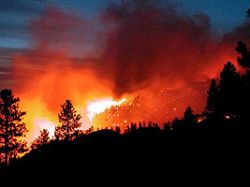Cariboo Forest Fires=Colder N.American Winters?
BLOG POST about Environment posted on August 5, 2010 by Greg Dean
Working in the dead red forests of the pine-beetle infested Cariboo, B.C. a few years ago, we took a helicopter up over Tweedsmuir Provincial Park, and it hit me like a ton of bricks; I got out of the helicopter and said to a friend “as far as the eye can see will burn, the dark carbon cloud will then hover over these glaciers, the melt off will flood down the creeks and canyons destroying much infrastructure and plugging tributaries for a generation, and then one of the largest fresh water reserves on Earth, now deposited in the Pacific could suppress the natural surfacing of warmer waters from the South and we in the Pacific North could freeze in even colder winters”. This doesn’t even include the Dimming Effect as researched over the Indian Ocean, which shows us how fine soot particles in the atmosphere often result in heavier rains to wash away the glaciers. Rain which will likely be warmer from that black cloud, because instead of the sun bouncing off the high altitude snow pack and glaciers, it gets attracted and absorbed by the black Cariboo charcoal cloud.
When you fly between Vancouver and Bella Coola, the fact of our Coast Range being one of the largest fresh water reserves on Earth hits any travelled person as uncontroversial.
The Norwegians and Brits have spent a pretty penny researching the North Atlantic and the effects of melt off from the Greenland ice-shelf into the ocean. They have garnered some idea of how the density variation between fresh water and salt water can effect planetary ocean circulation. Circulation refers to the fact that the oceans are a major part of the planet’s circulation system. If it weren’t for major currents distributing warm water from the middle of the planet to we in the South and North (from Canada’s 49th at least, for example) might be the peoples finding ourselves in super cold and the equator may get quite hotter.
In the Pacific however, we know pretty much jack. Our governments haven’t invested in the research like the Brits and Norwegians have for their Atlantic Ocean. The most we know about our currents is from some container of rubber duckies falling off a ship from Taiwan (no foolin’) and the rubber duckies being found along the way in Alaska, through the North West Passage (through the Northern Pole of the planet) and eventually spitting out on shores in the North Atlantic.
Now, even with close to 30 years of data as analyzed by Ruth Curry, a Norwegian scientist, we can’t say how it will affect the gulf-stream in the Atlantic, but she notes: "It certainly makes sense to continue monitoring ocean, ice, and atmospheric changes closely,” Curry said. “Given the projected 21st century rise in greenhouse gas concentrations and increased fresh water input to the high latitude ocean, we cannot rule out a significant slowing of the Atlantic conveyor in the next 100 years. I emphasize that we are talking about century time-scales to witness measurable changes in the ocean transports of mass and heat across the Greenland-Scotland Ridge-we are not suggesting that the Gulf Stream will shut down.”
That’s all well and good to have the data for the Atlantic, but how does the Pacific play into this, how does fresh water run-off from B.C. and Alaska affect the North West climate, salinity composition into the North Atlantic and vice versa? Here on the Pacific we have to point to rubber duckies and wonder, while our leaders undermine policy abroad and under-fund research at home. We hardly know a thing about the macro systems of the largest ocean in the world (according to my last check of the journals in May 2010), and yet there are high-level policies for biosphere-engineering which are already underway; chem-trail spraying, for example, is an undeniable fixture, especially here in Canada.
As the tipping points build on top of each other from initial pestilence infesting Northern forests because of the the current stages of climate change, we in B.C. do something between nothing and f*)k all to manage a biologically responsible revival of our boreal and interior forests. We go on planting more pine and spruce farms and clear cutting. As a consequence of earlier stages of climate change, dried out dead forests, bigger than most countries, are going up in smoke, producing a black cloud that will attract the sun, which could well sit over the 2nd largest fresh water reserve (some say) in the world and melt it at very fast. Then we just don’t know what happens in-turn from the melt-off into the Pacific. The bio-engineers are quite literally flying blind!
Next week we’ll explore my hypothesis of how climate change, snow pack and glacier run-off may be immediately decimating our salmon stocks. I'll also speak to the systemic solutions, as I'm not that progressive who f*)ks you with 17" of detailed analysis of how f*_k*d we are (no sh*t Sherlock! is the right response to such progressives) accompanied with a pitiful spitball of some reformist lube 'solution'.
The site for the Vancouver local of The Media Co-op has been archived and will no longer be updated. Please visit the main Media Co-op website to learn more about the organization.
